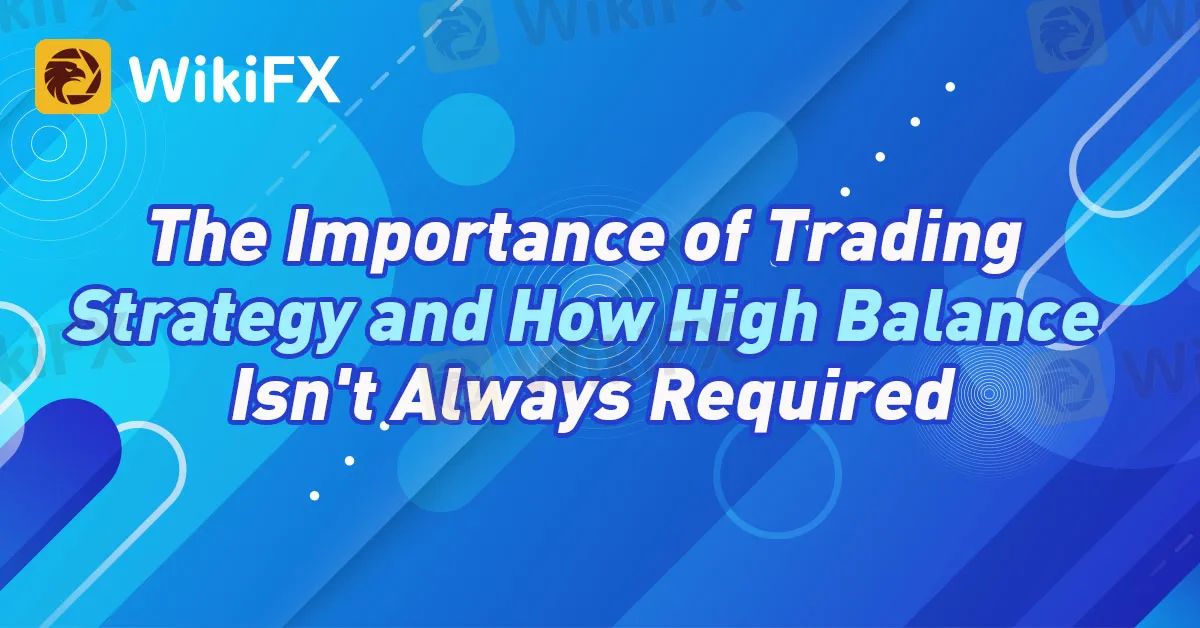简体中文
繁體中文
English
Pусский
日本語
ภาษาไทย
Tiếng Việt
Bahasa Indonesia
Español
हिन्दी
Filippiiniläinen
Français
Deutsch
Português
Türkçe
한국어
العربية
The Importance of Trading Strategy and How High Balance Isn't Always Required
Abstract:When it comes to trading, many people believe that a high account balance is a prerequisite for success. However, this is not always the case. While having a substantial balance can provide certain advantages, it is the trading strategy that ultimately determines a trader's success, not just the account size.

When it comes to trading, many people believe that a high account balance is a prerequisite for success. However, this is not always the case. While having a substantial balance can provide certain advantages, it is the trading strategy that ultimately determines a trader's success, not just the account size.
A trading strategy is a set of rules and guidelines that govern a trader's decision-making process. It encompasses various aspects, such as entry and exit points, risk management, and position sizing. A well-defined and carefully executed trading strategy can lead to consistent profitability, regardless of the account balance.
The key to a successful trading strategy lies in its effectiveness, not in the account balance. A strategy that focuses on analyzing market trends, identifying high-probability setups, and effectively managing risk can yield positive results, even with a relatively modest account balance. It is the quality of the trades and the ability to execute the strategy that matters, not the size of the account.
Moreover, trading strategies can be tailored to individual risk tolerance and financial goals. Traders with smaller account balances can opt for strategies that prioritize capital preservation and aim for consistent, smaller gains. On the other hand, traders with larger balances may choose strategies that allow for more significant positions and potential higher returns. The key is to find a strategy that aligns with your risk appetite and objectives.
By focusing on developing and refining a sound trading strategy, traders can achieve consistent profitability and long-term success. It is crucial to backtest the strategy, analyze historical data, and adapt it to changing market conditions. Continuous learning, experimentation, and adjustments are essential components of successful trading strategies.
While a high account balance can provide certain advantages, such as the ability to trade larger positions, it is not a substitute for a robust trading strategy. In fact, relying solely on a large account balance without a well-defined strategy can lead to reckless trading decisions and significant losses. It is the combination of a well-executed strategy and effective risk management that separates successful traders from the rest.
In conclusion, trading strategy plays a vital role in a trader's success, and a high account balance is not always necessary. A well-defined and effectively executed strategy can lead to consistent profitability, regardless of the account size. By focusing on developing and refining your trading strategy, adapting it to changing market conditions, and practicing disciplined risk management, you can achieve long-term success as a trader. Consider utilizing the resources and services provided by WikiFX to enhance your trading journey.

Disclaimer:
The views in this article only represent the author's personal views, and do not constitute investment advice on this platform. This platform does not guarantee the accuracy, completeness and timeliness of the information in the article, and will not be liable for any loss caused by the use of or reliance on the information in the article.
Read more

The Daily Habits of a Profitable Trader
Every professional trader follows a structured approach to ensure they are well-prepared, disciplined, and able to seize opportunities with confidence. Whether you are a seasoned investor or an aspiring trader, adhering to a robust daily checklist can significantly enhance your performance. Use this checklist to check if you are a qualified trader

TradingView Brings Live Market Charts to Telegram Users with New Mini App
TradingView has launched a mini app on Telegram, making it easier for users to track market trends, check price movements, and share charts.

Unlocking the Power of Algo Trading: Benefits and Limitation
Algorithmic trading merges speed, data, and automation—but can it outsmart human intuition and market chaos? Explore its power and pitfalls.

Do This ONE Thing to Transform Your Trading Performance Forever
The story is all too familiar. You start trading with high hopes, make some quick profits, and feel like you've finally cracked the code. But then, just as fast as your gains came, they disappear. Your account balance dwindles, and soon you’re left wondering what went wrong. Worse still, fear and confusion creep in, making every new trade a stressful gamble rather than a calculated decision. If this cycle sounds familiar, you’re not alone.
WikiFX Broker
Latest News
The Withdrawal Trap: How Scam Brokers Lure Victims into Paying More
FCA to Investors: Think Twice Before Trusting These Brokers
Trump\s tariffs: How could they affect the UK and your money
Trump gambles it all on global tariffs he\s wanted for decades
TradingView Brings Live Market Charts to Telegram Users with New Mini App
Trump tariffs: How will India navigate a world on the brink of a trade war?
Interactive Brokers Launches Forecast Contracts in Canada for Market Predictions
Authorities Alert: MAS Impersonation Scam Hits Singapore
Stocks fall again as Trump tariff jitters continue
IG Group Acquires Freetrade for £160M to Expand UK Investment Market
Currency Calculator







